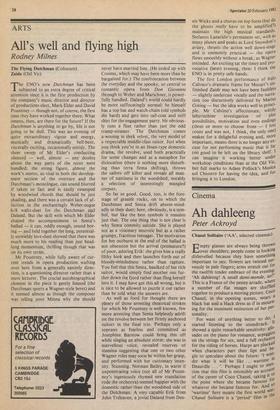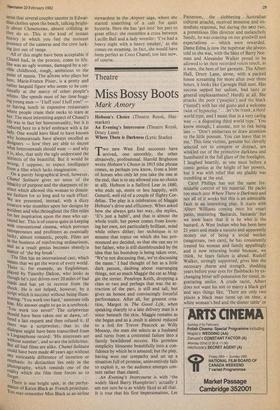Cinema
Ah dahleeng
Peter Ackroyd
Chanel Solitaire (`AA', selected cinemas) Empty glasses are always being throws over shoulders; people come in looking dishevelled because they have something important to say; flowers are twisted ner- vously in pale fingers; arms stretch out for the twelfth tender embrace of the evening! ‘Ah dahleeng! A small demi-monde, no?' This is a France of the penny arcade, where a number of flat images are shuffled together to produce a moving picture. Coco Chanel, in the opening scenes, wears a black hat and a black dress as if in mourn- ing for the imminent extinction of her Per- sonality. For want of anything better to do, I started listening to the soundtrack. .1.1 showed a quite remarkable sensitivity: Os' sades on the piano for romance, arpeggios on the strings for sex, and a full orchestra for the riding of horses. Harps are plucked when characters part their lips and be- gin to speculate about the future: won- der what it will be like ... wartime to Deauville ... ', Perhaps I ought to Evert: don that this film is ostensibly an account of the career of Coco Chanel, taking it to the point where she became famous for whatever she became famous for. And so `wartime' here means the first world war' Chanel Solitaire is a 'period' film in the
sense that several couples saunter in Edwar- dian clothes upon the beach, talking bright- ly about Clemenceau, almost colliding as they do so. This is the kind of instant history in which you feel the insistent presence of the cameras and the crew lurk- ing just out of range.
All of this might have been acceptable if Chanel had in the process, come to life. She was an ugly woman, damaged by a ter- rible childhood, tough, ambitious to the Point of mania. The actress who plays her here, Marie-France Pisier, is a pretty and rather languid figure who seems to be con- tinually at the mercy of other people's Whims. She spends most of her time hugg- ing young men —'I luff you! I luff you!' or having lunch in expensive restaurants ,Where people crane their necks to stare at her. The most interesting aspect of Chanel's life was in fact her homosexuality, but it is reduced, here to a brief embrace with a fat lady. One would have liked to have known Why homosexuals have always excelled as designers — how they are able to decree What heterosexuals should wear — and why it is, also, that only the ugly understand the instincts of the beautiful. But it would be wrong I suppose, to expect intelligence from a film which lacks imagination.
On a purely biographical level, however, Chanel Solitaire gives no sense of the tenacity of purpose and the sharpness of in- stinct which allowed this woman to domin- ate fashion for so long and to such effect. We are presented, instead, with a dizzy creature who stumbles upon her designs by accident and who throughout the film relies for her inspiration upon the men who sur- round her. This is of course quite in keeping With conventional cinema, which portrays entrepreneurs and profiteers as essentially lucky, almost romantic, people. Films are in the business of reinforcing ordinariness, and as a result genius becomes sheerly a Matter of 'the big break'. The film has an international cast, which means that we get the worst of every world. There is, for example, an Englishman, Played by Timothy Dalton, who looks as though he's just driven over 20 miles of bad roads and has yet to recover from the shock. He is not helped, however, by a script which is succinct without being illum- inating: 'You work too hard,' someone tells hirn. His answer ought to go in a textbook: 'You work too never!' The scriptwriter should have been taken out at dawn, of- fered a last request and then refused it. If there was a scriptwriter, that is; the dialogue might have been transcribed from a Linguaphone record: 'His mistresses are Without number', and so are the infelicities. But all bad films are alike. Chanel Solitaire could have been made 40 years ago without any noticeable difference of intention or emphasis: its distinction lies only in the Photography, which reminds one of the reality which the film then forces us to torget.
There is one bright spot, in the perfor- mance of Karen Black as French prostitute. You °I-1 may remember Miss Black as an airline stewardess in the Airport saga, where she started something of a cult for quiet hysteria. Here she has 'got into' her part to great effect: she resembles a cross between Lucille Ball and a lady wrestler: 'I've had a heavy night with a heavy smoker,' as she comes on steaming. In fact, she would have been perfect as Coco Chanel; too late now, of course.







































 Previous page
Previous page